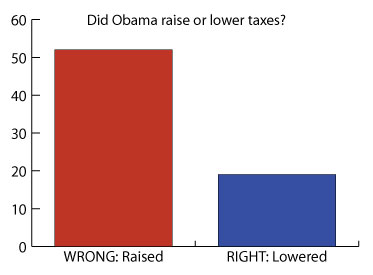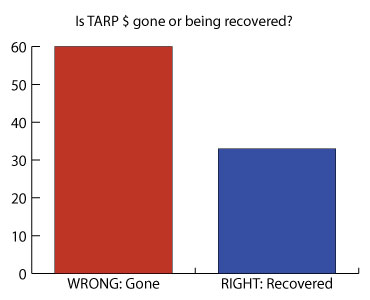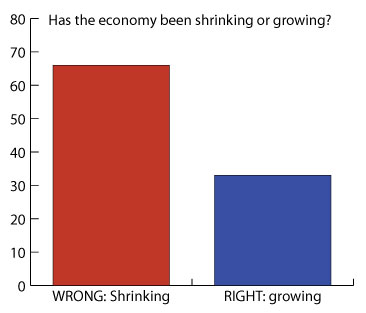Reporters, pundits and even some Democratic leaders are starting to adopt as conventional wisdom that there must be some policy lesson in the results from November 2.
But the Democratic record didn't actually matter much in the mid-terms. It couldn't have, because most voters don't actually know what that record is.
- A Bloomberg poll run shortly before the election showed that 52 percent of likely voters thought their taxes had gone up under the Obama administration, while only 19 percent correctly understood that taxes have been lowered. Even 43 percent of Democrats wrongly thought taxes had gone up.
- 66 percent wrongly believed the economy has been shrinking under Obama, while only 33 percent knew it's been growing.
- 60 percent wrongly believed most of the TARP money for banks was gone for good, while only 33 percent knew that most will be recovered. (The Treasury actually expects to make a $16 billion profit on the $245 billion spent rescuing Wall Street.)
- After hundreds of millions of dollars have been spent bashing "Obamacare", about half of Americans now say they don't like health care reform. But when asked about its individual components, they do.

 And it's not just voters who were deceived: many in the media are stuck inside Republican framing and can't get out. On 60 Minutes Sunday night , interviewer Steve Kroft repeatedly asked President Obama if he had heard the message that voters want "smaller, less costly, more accountable" government. Kroft seemed unable to hear Obama's answer that he wants those things too -- he campaigned on them. His signature health care reform aims to reduce the single biggest source of government spending (26 percent of the federal budget and growing). The burst of spending early in his administration was an emergency response to stave off a Depression, not a policy preference.
And it's not just voters who were deceived: many in the media are stuck inside Republican framing and can't get out. On 60 Minutes Sunday night , interviewer Steve Kroft repeatedly asked President Obama if he had heard the message that voters want "smaller, less costly, more accountable" government. Kroft seemed unable to hear Obama's answer that he wants those things too -- he campaigned on them. His signature health care reform aims to reduce the single biggest source of government spending (26 percent of the federal budget and growing). The burst of spending early in his administration was an emergency response to stave off a Depression, not a policy preference.
Meanwhile Republicans offer only vague promises and meaningless gestures, such as "cutting waste" or "tort reform", neither of which, as they well know, would make more than a dent in the problem. But because Republicans are better at spinning the narrative, they get to wear the mantle of "fiscal responsibility" in the eyes of many voters and many journalists.
 Now if only Democratic leaders can avoid falling for it as well. Some are already talking about the need to show they "get the message", by working with Republicans on policy adjustments.
Now if only Democratic leaders can avoid falling for it as well. Some are already talking about the need to show they "get the message", by working with Republicans on policy adjustments.
Meanwhile many progressive Dems are arguing that the administration was already leaning too far right. The mid-terms offer nothing useful to this debate. And to the extent it devolves into infighting, it will only harm Democratic chances in 2012.
But if Democrats can just stick to what's already working, those chances could be good. Republicans are vowing to attack the dramatic gains the administration and Congress made in the past 20 months, especially on health care reform and the economy. We hope Democrats realize that an opponent is also an opportunity. Democrats can use Republicans' granitic opposition to progress to define a clear and positive choice. And they can take a smart gamble on leveraging at least two likely trends between now and November, 2012: the emerging benefits of health care reform and a steadily improving economy. As the president said on "60 Minutes", voters are mostly angry about high unemployment and too much of the same old Washington game-playing.
If unemployment comes down, and Democrats can offer not game-playing but strong, committed leadership, they'll win. But if they agonize over modulating policy in response to a supposed "message from voters" that has no basis in reality, they'll be vulnerable to more losses like the ones we just saw.